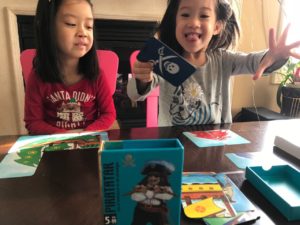At a very young age, children have the urge to win as a way to display a sense of mastery. Whether it be dressing themselves or reaching a higher shelf, they just want to show they can do anything we adults can do. During game play, a successful move or an early lead gives them great pride. At the same time, when luck doesn’t fall their way it can bring strong feelings of sadness. This may be the hardest thing for a child to wrap their head around. Why play a game if in the end we lose? It’s a valid question and being prepared is the best way to get the message across. Your job, if you choose to accept it, is to convince them that games are fun regardless of the outcome.
Here are some tips for teaching our kids to lose (and win) gracefully.
Choose the Right Game
Choosing the right game for YOUR child is critical. This is one of the main reasons we began Little Meeples; to show our friends and everyone else what games are out there and how they are carefully designed to create an enjoyable experience, win or lose.

Throughout all our posts we often mention cooperative games. These games are perfect to gradually expose children to the feelings of winning and losing. Whatever the outcome, you all experience it together. It’s a great opportunity to show by example how we should react to losing and winning.
When you do play competitively, always remind them that everyone wins and loses at some point. It is difficult for our older daughter to lose gracefully so we would remind her of a game where she won and others lost but everyone still had fun. Then we would suggest playing a game that she may be particularly good at. When you have several children, alternate between games based on each child’s strength so that they would each have a turn at practicing how to win or lose gracefully. For example, our oldest daughter seems to always win at Go Cuckoo while our younger daughter is good at Monza. We would try to play both games in one sitting so both kids would have a chance to win AND lose.
Make it Fun
The only way to cope with loss is to have fun. Create excitement around much more than the final outcome by focusing on the theme/story and the successful decisions they make with each turn. Make the game play as enjoyable as possible. Be as animated as possible. Laugh out loud, maybe sometimes maniacally. Your attitude will dictate your child’s attitude. For them to have a blast, you will have to appear to be having the absolute time of your life. Children are social mimics, they learn through behavioral imitation and YOU are the strongest source of that lesson. We want our children to know that playing this game is the greatest, even before the final outcome is known.
Embrace their Emotions
Board games are loads of fun, but they can also be frustrating. Classic children games often involved a hefty amount of luck. When that luck doesn’t fall your way, it can be mighty disappointing. For a child, that feeling is amplified. Each successive time it happens, the frustration grows exponential.
Sometimes it is very difficult for the kids to absorb their disappointment/sadness over losing and there is nothing wrong with that. Acknowledge their emotions. They don’t have to shut those emotions off. They just have to learn to cope with them. A child’s ability to cope with emotions is very dependent on their developmental stage. It can be tempting as a parent to proclaim it’s just a game, but certain children have yet to fully understand their own emotions. When a child responds to a death in the family we wouldn’t insist that it’s “just the way life works”. Understanding that an emotion is normal is the first step to developing coping mechanisms for it.
Discuss your emotions with the kids. Let them know it’s ok to feel the way they do and teach them how to respond to those feelings. Emphasize how fun it was to play a game even when you lost, especially how fun it was to play with THEM. They need to know that it’s not the game that is fun, it’s the time you spend together that is fun and the reason we play.

We also want our children to understand how it makes others feel to play with someone who may sulk or cry when they lose. It can take away from the fun (just as much as a gloating winner can). It’s ok to have those feelings but don’t assign blame to the winner and remember the fun that was had playing the game together.
Don’t forget to provide a healthy dose of big hugs!
Communication is Key
Constant communication is critical to getting ahead of powerful emotions. Make sure to open a dialogue before, during and after each game.
- Before – Set expectations for the game. Remind them that there will be one winner and it’s ok if it’s not them. Remind them that we play to learn and to have fun, not that we play to win. And remind them how we should act if we do lose, as well as if we win.
- During – Highlight mid-game strategies. Discuss your own in-game decisions and why you are doing them. This will show them game strategies that they can slowly absorb. When someone does a great move that pushes them forward point it out and be generous with the high-fives. Positive reinforcement is key here. Any good behaviour needs to be emphasized. At the same time, if someone falls behind, remind them that it’s still early. Discuss ways their luck can turn around. Provide ideas or imaginative stories of their character in distress to make the situation more engaging. We want to encourage them to continue to play and to not give up.
- After – Discuss your experience. Talk about things they did well during the game and why it may have helped them win. Casually suggest decisions someone could have made to help them do better next time (but don’t focus too much on what they did to make them lose). Most of all, make it clear that you had fun (especially if you lost) and remind them it’s the journey not the end goal that matters. Emphasize that you enjoy their company and you’re not there to find out if you win or not.
The way you communicate will depend on the age and experience of your child. For older kids, you can focus more on strategy talk to help them grow and develop stronger critical thinking. However, for younger kids focus more on the experience to encourage future plays, the strategies will come later so maybe don’t dwell on it for too long.
Let Them Win
Sometimes we as parents lose on purpose to model how to lose gracefully, more so when children are very young. It helps to make a game out of how funny it can be to lose. For example when James was playing Monza with the kids, his dice rolls were so terrible that the kids reached the finish line before he was even halfway around the track. James would laugh at how terrible he was doing. The kids were very empathetic but also laughing with James. This showed the kids that the objective is to have fun together. And fun can be had even when losing.
Don’t Let Them Win
As much as letting a child win can help boost their self-confidence, we can’t be too easy on them. We want to give them the sense of perseverance and earning a win, especially at older ages when they can handle the string of losses. If they lose at a game many times, that eventual win will feel so much more satisfying. Even at younger ages losses are opportunities to practice their coping mechanisms. It gives them a place to let those feelings pass and the emotions will become less intense with each loss.
There is often conflicting views regarding letting your children win at board games. Balancing wins and losses with your children depends on the personality of your child. You know best how they respond to certain situations, so any decision you make will likely be the best decision.
Display Proper Sportsmanship

It can be tough to teach kids how to win gracefully when they are so happy about winning they start dancing all over the place. However this is also the best chance to teach them about empathy. Try to get them to see other players perspective and how they feel to have lost and to have that loss rubbed in their face. We often tell them it must feel so nice to win but remember that other people may be feeling bad about losing. Remind the winner that no one would want to play with someone who makes a big deal about winning because they make others feel terrible about losing. Also encourage them to tell the other players that it was lots of fun and that they all played a good game.
The losers need to display sportsmanship too with a “Good game, you played very well” and hand shakes (or high fives) all around. It will take longer to get them to do this one.
Role Play
Since children learn by example, sometimes we have to show how it feels to be on the receiving end of a sore loser (or winner). Imagine if a grown up started to cry after a loss. Imagine if a grown up stomped off mid game because they were currently last. Throw an overblown hissy fit! You’ll be surprised when your children tell you “It’s just a game!”
Deep down children know how they should act, it just takes time and practice to apply the right coping mechanisms. Seeing your exaggerated “poor” emotional response will be a good reminder and a good teaching moment. Ask them “how does it make YOU feel when I act this way.” Ask them “what should I do when I lose?” They will then help make a plan of how to control your emotions. When they make good suggestions, reinforce it!
If you have a child who is an obnoxious winner, feel free to go overboard when you win. They need to know the effect such behaviour has on people. And remind them how much better it would be if you just gave a high five and said “good game.”
Conclusion
Ultimately games are another avenue for us to flex the parenting muscle and help our children learn to become more resilient to life’s ups and downs. It’s not easy to help them manage their emotions in both winning and losing but hopefully some of the tips above will help you guide them. Every child is different and their emotional control is both age and personality dependent. YOU know your child best and most likely will know the best method for YOUR child to conquer this hurdle. Never give up and keep on gaming.

One thought to “Losing and Winning Gracefully”
This is a wonderful article, thank you. Good sportsmanship is important to me too. I’m a chess coach and I can attest that chess is a wonderful game to teach sportsmanship and how to take losses as learning opportunities. I’m incredibly interested in the balance between letting a child win and playing honestly, particularly in a game of pure skill. Clever children could know you’re throwing the game and that could be hurtful. But it’s hard to know the perfect way to handle that.